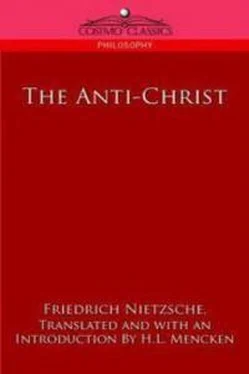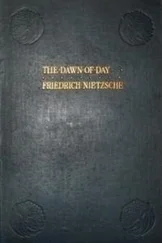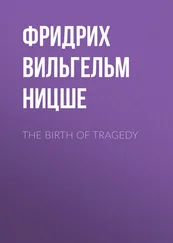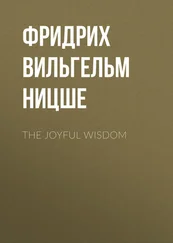The Antichrist
Friedrich Wilhelm Nietzsche
Save for his raucous, rhapsodical autobiography, "Ecce Homo," "The Antichrist" is the last thing that Nietzsche ever wrote, and so it may be accepted as a statement of some of his most salient ideas in their final form. Notes for it had been accumulating for years and it was to have constituted the first volume of his long–projected magnum opus , "The Will to Power." His full plan for this work, as originally drawn up, was as follows:
Vol. I. The Antichrist: an Attempt at a Criticism of Christianity.
Vol. II. The Free Spirit: a Criticism of Philosophy as a Nihilistic
Movement.
Vol. III. The Immoralist: a Criticism of Morality, the Most Fatal
Form of Ignorance.
Vol. IV. Dionysus: the Philosophy of Eternal Recurrence.
The first sketches for "The Will to Power" were made in 1884, soon after the publication of the first three parts of "Thus Spake Zarathustra," and thereafter, for four years, Nietzsche piled up notes. They were written at all the places he visited on his endless travels in search of health—at Nice, at Venice, at Sils–Maria in the Engadine (for long his favourite resort), at Cannobio, at Zürich, at Genoa, at Chur, at Leipzig. Several times his work was interrupted by other books, first by "Beyond Good and Evil," then by "The Genealogy of Morals" (written in twenty days), then by his Wagner pamphlets. Almost as often he changed his plan. Once he decided to expand "The Will to Power" to ten volumes, with "An Attempt at a New Interpretation of the World" as a general sub–title. Again he adopted the sub–title of "An Interpretation of All That Happens." Finally, he hit upon "An Attempt at a Transvaluation of All Values," and went back to four volumes, though with a number of changes in their arrangement. In September, 1888, he began actual work upon the first volume, and before the end of the month it was completed. The Summer had been one of almost hysterical creative activity. Since the middle of June he had written two other small books, "The Case of Wagner" and "The Twilight of the Idols," and before the end of the year he was destined to write "Ecce Homo." Some time during December his health began to fail rapidly, and soon after the New Year he was helpless. Thereafter he wrote no more.
The Wagner diatribe and "The Twilight of the Idols" were published immediately, but "The Antichrist" did not get into type until 1895. I suspect that the delay was due to the influence of the philosopher's sister, Elisabeth Förster–Nietzsche, an intelligent and ardent but by no means uniformly judicious propagandist of his ideas. During his dark days of neglect and misunderstanding, when even family and friends kept aloof, Frau Förster–Nietzsche went with him farther than any other, but there were bounds beyond which she, also, hesitated to go, and those bounds were marked by crosses. One notes, in her biography of him—a useful but not always accurate work—an evident desire to purge him of the accusation of mocking at sacred things. He had, she says, great admiration for "the elevating effect of Christianity … upon the weak and ailing," and "a real liking for sincere, pious Christians," and "a tender love for the Founder of Christianity." All his wrath, she continues, was reserved for "St. Paul and his like," who perverted the Beatitudes, which Christ intended for the lowly only, into a universal religion which made war upon aristocratic values. Here, obviously, one is addressed by an interpreter who cannot forget that she is the daughter of a Lutheran pastor and the grand–daughter of two others; a touch of conscience gets into her reading of "The Antichrist." She even hints that the text may have been garbled, after the author's collapse, by some more sinister heretic. There is not the slightest reason to believe that any such garbling ever took place, nor is there any evidence that their common heritage of piety rested upon the brother as heavily as it rested upon the sister. On the contrary, it must be manifest that Nietzsche, in this book, intended to attack Christianity headlong and with all arms, that for all his rapid writing he put the utmost care into it, and that he wanted it to be printed exactly as it stands. The ideas in it were anything but new to him when he set them down. He had been developing them since the days of his beginning. You will find some of them, clearly recognizable, in the first book he ever wrote, "The Birth of Tragedy." You will find the most important of all of them—the conception of Christianity as ressentiment —set forth at length in the first part of "The Genealogy of Morals," published under his own supervision in 1887. And the rest are scattered through the whole vast mass of his notes, sometimes as mere questionings but often worked out very carefully. Moreover, let it not be forgotten that it was Wagner's yielding to Christian sentimentality in "Parsifal" that transformed Nietzsche from the first among his literary advocates into the most bitter of his opponents. He could forgive every other sort of mountebankery, but not that. "In me," he once said, "the Christianity of my forbears reaches its logical conclusion. In me the stern intellectual conscience that Christianity fosters and makes paramount turns against Christianity. In me Christianity … devours itself."
In truth, the present philippic is as necessary to the completeness of the whole of Nietzsche's system as the keystone is to the arch. All the curves of his speculation lead up to it. What he flung himself against, from beginning to end of his days of writing, was always, in the last analysis, Christianity in some form or other—Christianity as a system of practical ethics, Christianity as a political code, Christianity as metaphysics, Christianity as a gauge of the truth. It would be difficult to think of any intellectual enterprise on his long list that did not, more or less directly and clearly, relate itself to this master enterprise of them all. It was as if his apostasy from the faith of his fathers, filling him with the fiery zeal of the convert, and particularly of the convert to heresy, had blinded him to every other element in the gigantic self–delusion of civilized man. The will to power was his answer to Christianity's affectation of humility and self–sacrifice; eternal recurrence was his mocking criticism of Christian optimism and millennialism; the superman was his candidate for the place of the Christian ideal of the "good" man, prudently abased before the throne of God. The things he chiefly argued for were anti–Christian things—the abandonment of the purely moral view of life, the rehabilitation of instinct, the dethronement of weakness and timidity as ideals, the renunciation of the whole hocus–pocus of dogmatic religion, the extermination of false aristocracies (of the priest, of the politician, of the plutocrat), the revival of the healthy, lordly "innocence" that was Greek. If he was anything in a word, Nietzsche was a Greek born two thousand years too late. His dreams were thoroughly Hellenic; his whole manner of thinking was Hellenic; his peculiar errors were Hellenic no less. But his Hellenism, I need not add, was anything but the pale neo–Platonism that has run like a thread through the thinking of the Western world since the days of the Christian Fathers. From Plato, to be sure, he got what all of us must get, but his real forefather was Heraclitus. It is in Heraclitus that one finds the germ of his primary view of the universe—a view, to wit, that sees it, not as moral phenomenon, but as mere aesthetic representation. The God that Nietzsche imagined, in the end, was not far from the God that such an artist as Joseph Conrad imagines—a supreme craftsman, ever experimenting, ever coming closer to an ideal balancing of lines and forces, and yet always failing to work out the final harmony.
Читать дальше











